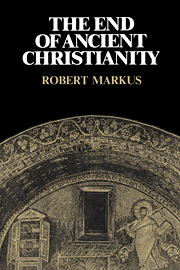Book contents
- Frontmatter
- Contents
- Preface
- Abbreviations
- 1 Introduction: ‘secularity’
- I The crisis of identity
- 2 ‘A great multitude no man could number’
- 3 Conversion and uncertainty
- 4 Augustine: a defence of Christian mediocrity
- 5 ‘Be ye perfect’
- II Kairoi: Christian times and the past
- III Topoi: space and community
- Sources referred to
- Secondary literature referred to
- Index
5 - ‘Be ye perfect’
Published online by Cambridge University Press: 05 June 2012
- Frontmatter
- Contents
- Preface
- Abbreviations
- 1 Introduction: ‘secularity’
- I The crisis of identity
- 2 ‘A great multitude no man could number’
- 3 Conversion and uncertainty
- 4 Augustine: a defence of Christian mediocrity
- 5 ‘Be ye perfect’
- II Kairoi: Christian times and the past
- III Topoi: space and community
- Sources referred to
- Secondary literature referred to
- Index
Summary
The message of Pelagius was a call to the Church at large. Its appeal was strong, especially to Christian lay people of high social rank. It summoned Christians to a life of perfection. It preached an austere morality akin to the ascetic discipline of the monastic tradition. Monks were, by definition, dedicated to the ideal – the pursuit of perfection – which Pelagius wished to hold up to the lay world. It was not monks who needed to take note of this teaching, and not monks who were liable to be disturbed by it. It was Augustine's doctrine, rather than Pelagius', that raised doubts among them. If Augustine was right, the ground on which they stood would be undermined. If salvation was a work of God's grace and not of man's effort, what was the point of their special exertions in the religious life? Would the condemnation of Pelagius in 418, and the triumph of Augustinian theology, not tend to sap the mainspring of ascetic dedication? Would trust in grace not paralyse effort? This problem was raised in acute form in African monastic quarters in 426–7, and not much later in Southern Gaul.
A copy of one of Augustine's most uncompromising statements against Pelagius, a letter (Ep. 194) written some eight years earlier to the Roman priest (later pope) Sixtus, who had been sympathetic to Pelagius, became known to the monks of Hadrumetum.
- Type
- Chapter
- Information
- The End of Ancient Christianity , pp. 63 - 84Publisher: Cambridge University PressPrint publication year: 1991



